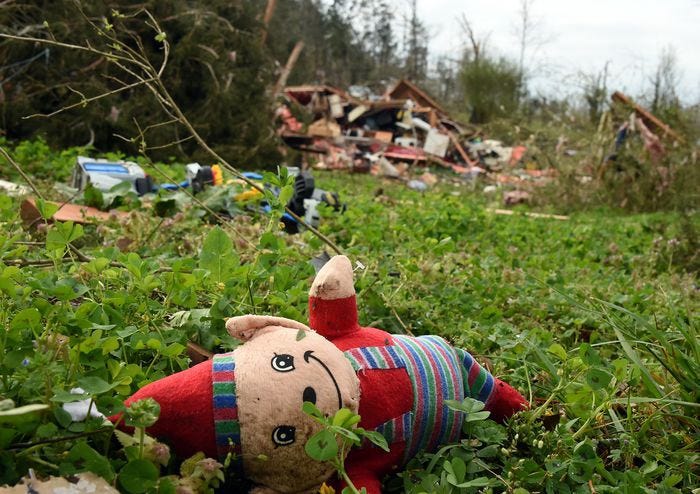How Not to Cover a Disaster
Six things the media really has to stop doing while on the disaster beat.
Disasters happen and reporting them is essential, but there’s always that dead air — when nothing more is happening and we’re awaiting more news. That’s when the dread ‘human interest’ stories fill the time, the reporters turning from the real story to look for victims who will try to answer the unanswerable questions: “How did you feel?” “What went through your head?” “Did you think you would ever see your family again?”
The injured — many of them still traumatized, still hurting, still trying to figure out where they are and what happened — are forced to face a camera pointed at their faces, a microphone held at arm’s length to catch their every word, their every sob.
I think I can safely say that for that one person out of a hundred who wants to see bloodied heads and terrified kids and TV personalities asking how the victims are feeling, there are 99 of us who don’t.
So here is my short list of disaster mistakes those pros might want to avoid if they want to remain professionals and not be seen forevermore as shameless hacks — starting with the least egregious:
1. If it’s a hurricane, a blizzard or a tornado, do not allow yourself to be talked into standing out in the wind and rain/snow in order to show your audience that it’s incredibly windy and raining/snowing really hard. Get yourself inside. Plant yourself in front of a window and direct the cameraperson (who doesn’t want to be out there any more than you do) to film you as you report on the wind and rain you can both see outside that window. We will see what you see. The effect will be the same — big wind, heavy rain/snow — and you’ll save your clothing, your hair and your dignity. (The best part is that it won’t be about you trying to challenge the weather when the real story is about the many others who will have lost everything.)
2. You should at all costs avoid the overuse of the following words or phrases — unless the use of them is absolutely essential to the story: (Hint: There is almost no case where these words will add anything to your story.) Death and destruction, horror, terror, disturbing, unspeakable, heartbreaking, heart-wrenching, heartrending, mangled bodies, crushed bodies, body parts, severed limbs, entrails, decapitation, impalement.
3. After the first two hours or so, it’s time to stop describing the scene as “like a battle/war zone”. Ditto, the sound as “like a freight train”. Break out the thesaurus if you must, but really — I beg you to cease and desist.
4. Do not stand in the same pile of rubble, dirty, mangled teddy bear in hand , repeating the same script hour after hour. Use a little imagination. We’re not all just coming to you for the first time; some of us have been tuned in for hours, impatiently waiting for some real news.
5. Avoid like the plague interviewing anyone who insists that God has saved them or their loved ones. We all understand that their gratitude knows no bounds once they find that they/their loved ones are alive, and it does seem miraculous, but please give some consideration to those folks who weren’t so lucky. Logic dictates that if God has the power and the inclination to save one person, he could also— but didn’t — save another. If the interviewee doesn’t have enough sense to understand how hurtful that can be to a victim’s family, you as the professional should. Don’t be a witness to that.
(In fact, don’t bring religion into an interview at all. Wolf Blitzer once asked a woman who had just survived a tornado if she had thanked God. “You gotta thank the Lord, right?”, he asked, and she said, laughing, “Actually, I’m an atheist.”)
6. And lastly and most importantly, never, never, never bend over and shove a microphone into a small child’s face, expecting them to say something meaningful. You will not only look stupid, you will have lost all semblance of integrity. Even if a parent gives permission and is standing right there encouraging that small child, do not do it. It isn’t about you. It isn’t about the parent. It isn’t about the ratings. As the viewer, it’s not about me, either. It’s about the children. This is their tragedy, not ours. We can’t begin to know how they feel, and it’s not our place to expect them to explain. (Note: if you find yourself searching for sad signs of a happier, pre-disaster child; a disheveled doll, a mangled pedal car, a broken toy, so you can go all melodramatic on us — stop. Just stop. Please.)
The victims deserve not to have to be victimized twice, all in the name of filling time while waiting for the rest of the story. The last thing they need in times like these is to have to wrestle with an over-zealous yahoo with a microphone and a camera. That’s why so many of them ask you to go away. It’s a pity more of them don’t.
Photo credit: Joe Songer for AL.com.
(Cross-posted at Medium)




